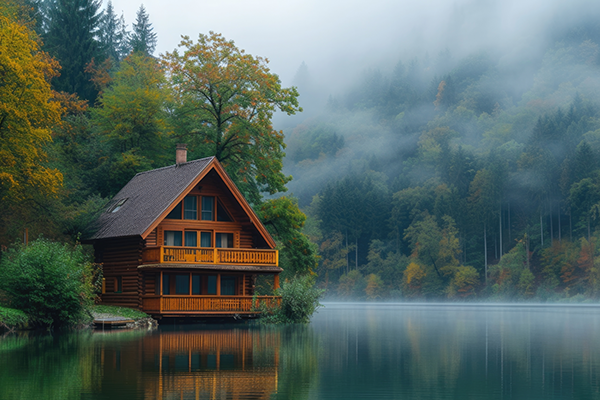With summer slowly winding down and another great year of memories behind you, have you thought about how you are going to keep the cottage in the family? Or perhaps it is time to sell the cottage? My thoughts on these questions and more in this recent article I was quoted in the Toronto Star. Portfolio Manager & Senior Financial Planner, Matthew Ardrey, to the Toronto Star.
![]()
Written by: Lora Grady
Personal Finance Reporter
Published August 18, 2025
It’s important to have a conversation with loved ones you’re thinking of transferring the property to sooner than later, experts says, to go over all the tax and legal implications that may arise.

Canadians who grew up going to their family’s cottage tend to have an emotional connection to the property, which is why many baby boomers want to pass it down to the next generation.
The financial and legal aspects of transferring cottage ownership, however, can be tricky to navigate.
The cottage is an emotionally-charged asset, says Matthew J. Ardrey, portfolio manager and senior financial planner at TriDelta Private Wealth. In some cases, “there are years and years of memories tied to this property.”
Glenn Karr, a 68-year-old real estate investor, grew up spending summers at Victoria Beach in Manitoba, about an hour north of Winnipeg.
In 1990, he bought a cottage in the area for around $50,000. Since then, he’s spent most summer weekends there with his family, including his 37-year-old daughter Andrea, who learned to swim at the beach and took sailing lessons at the nearby yacht club.
“She’s been in Toronto for 14 years, and the cottage is one of the biggest things that brings her back every summer,” he says. “I anticipate that unless she doesn’t want it, it will go to her.”
Find out how much the cottage is worth
If you’re thinking about passing down the cottage, get an opinion of value, says broker John Fincham, founder of real estate agency Finding Your Muskoka.
Cottage owners often guess their property’s worth or use an out-of-date valuation, but you need an accurate number based on current market conditions.
Glenn Karr hopes to one day pass on the family cottage in Victoria Beach, Manitoba, to daughter Andrea. “She’s been in Toronto for 14 years, and the cottage is one of the biggest things that brings her back every summer,” he says. “I anticipate that unless she doesn’t want it, it will go to her.”
The value should include all of your closing costs (legal fees, land transfer tax, etc.), plus any capital improvements you’ve made to the property, such as a new roof or a new septic tank, Ardrey says.
Keep your receipts for any of these improvements in case the CRA asks for them.
Call a family meeting
A recent report from ReMax found that 17 per cent of cottage owners who are planning to sell in the next one to two years said the next generation in their family is not interested in taking over the property.
Another 17 per cent plan to put the family cottage on the market as a result of an estate decision.
A common mistake people make is assuming that their children want to inherit the cottage, says Suzana Popovic-Montag, managing partner of Hull & Hull LLP. Family members may not want to deal with the tax implications or the costs of maintaining the property.
Unfortunately, Fincham says a lot of families will wait too long — until a parent is unwell or has passed away — to discuss what will happen to the family cottage.
That’s why it’s important to have a conversation with the people you’re thinking of transferring the property to sooner than later, where you can discuss everyone’s expectations.
Go over the tax and legal implications of owning the cottage, as well as complications that may arise.
Be aware of capital gains tax, probate fees and other costs
The most common way for people to pass down a cottage to a future generation is through an estate plan, Popovic-Montag says, where ownership transfers to a family member upon the owner’s death.
If this is what you want to do, remember to update your estate plan every few years or when there’s a change in circumstances.
As part of your estate planning, be aware of estate administration tax (also known as probate fees) in Ontario.
For cottages valued at over $50,000, the tax is calculated as $15 for every $1,000 (or 1.5 per cent). So if your cottage is worth $1 million, you’d be looking at $15,000 in probate fees.
Popovic-Montag says a lot of people get hung up on probate fees, but capital gains tax is a much bigger expense, and it’s typically unavoidable.
Any time there’s a disposition of the cottage, whether it is sold or transferred to another owner through an estate plan, capital gains tax will be triggered.
“The increase in the value from the date that you purchase the property and the date that your dispose of it is a taxable event,” Popvic-Montag explains.
David Pipe, adviser and mortgage broker at WealthTrack, often sees clients who think the easiest approach to passing down a cottage is to put their adult child’s name on the title while the parent is still alive in an effort to avoid probate fees, but it comes with a big potential tax bill.
For example, if a parent puts their child on the title so they become 50/50 owners, the CRA will consider you having sold half and you’ll incur capital gains tax right then and there.
Another common mistake people make is selling the cottage to a family member for $1 in an effort to avoid taxes.
“The CRA is going to turn around and say, ‘it’s not worth a dollar, it’s worth a million dollars,” Ardrey says. “You’re paying the full tax on it.’”
If you do choose to add someone to the cottage’s title, consult with a real estate lawyer to make sure you’re setting it up properly.
Parents who plan to leave the cottage to multiple kids may want to put together a cottage agreement that outlines their intentions for the cottage’s use, which could help avoid potential drama over who gets to visit and when.
Consider a trust or a life insurance policy to help cover costs
Ardrey says many cottage owners take out permanent life insurance policies that will pay out $500,000 and cover the capital gains tax.
“If the goal is to make sure the cottage is not going to be sold, it’s a pretty inexpensive way to pay for the taxes,” Ardrey says.
A joint life insurance policy will cover both spouses and can include a last-to-die policy, which means the insurance will be paid out upon the death of the second spouse.
“By putting two people on the insurance policy, it actually lowers the premiums,” Ardrey says.
In some cases, the cottage owner’s adult children will buy the life insurance policy for their parent(s) and pay the premiums.
When it comes to valuable cottages where the tax risk is higher, Pipe says a trust could be a good idea if you do it as early as possible.
“A trust is just like a little box that holds the cottage separately from you,” he says.
There is some cost to setting it up and you will have to pay the capital gains tax while you’re alive.
However, if you bought a cottage today and plan to pass it down to your kids, putting it into a trust quickly would mean the tax would be low.
After many years, however, folks in their 70s and 80s may not be able to afford the taxes around putting the cottage into a trust.
Trusts also have a 21-year deemed disposition rule, which means the cottage would be deemed to be sold every 21 years, Ardrey points out.
If you put the cottage in a trust at 60 and you still own the cottage at 81, you’ll have to pay capital gains tax.
The difference between which approach will work best for you ultimately comes down to the amount of tax risk you’re willing to take, Pipe says. It depends on your age and how much insurance costs, since life insurance gets exponentially more expensive as you get older.
Karr estimates that his cottage is worth around $350,000 to $400,000 now.
If his daughter decides to keep it once he passes it down to her as part of his estate, he hopes that she’ll be able to use it for at least one month out of the year as a place to relax and unwind, and rent it out the rest of the time to cover maintenance and other costs.
“If she decides she’s not going to use it or can’t use it, then it will just be part of her inheritance and she can do with it what she wants.”

Presented By:
Matthew Ardrey
Portfolio Manager & Senior Financial Planner
matt@tridelta.ca
(416) 733-3292 x230
